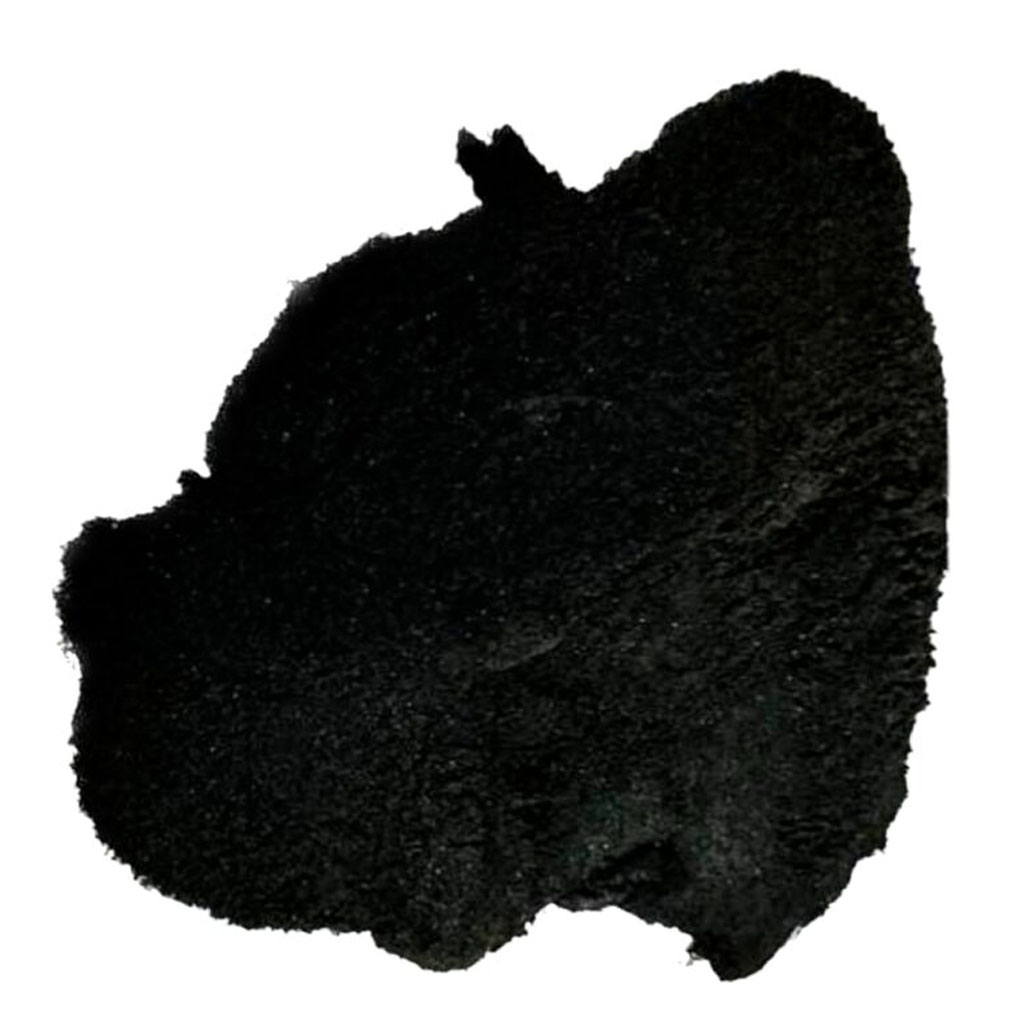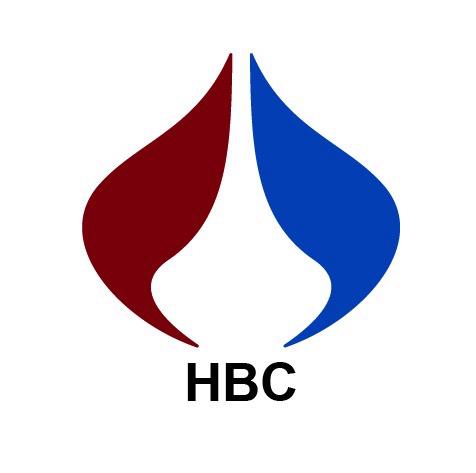Our Products
Highest quality raw materials from Indonesian plantations.
OUR PRODUCTS
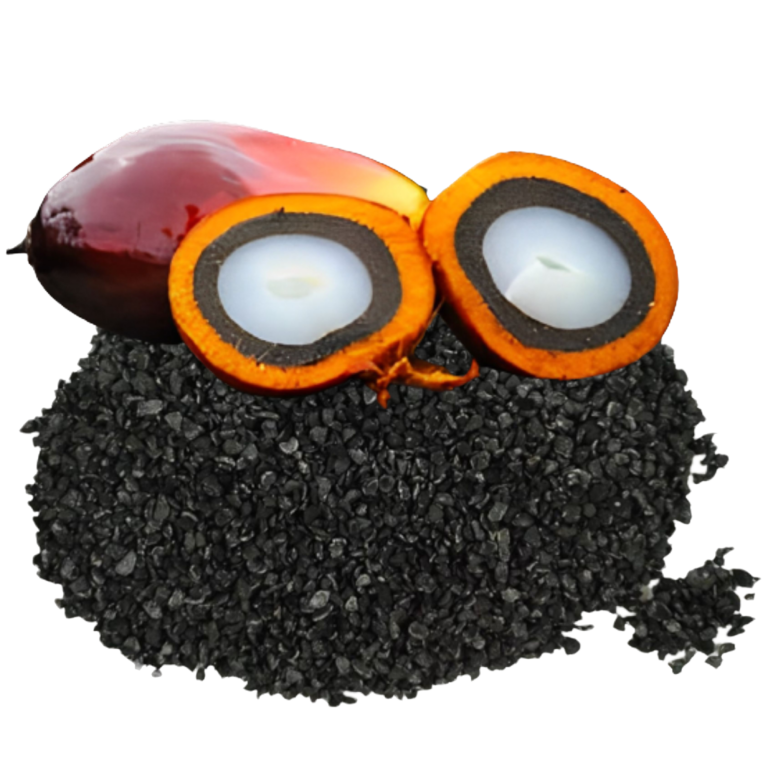
Palm Kernell Shell Activated Carbon
Palm Kernel Shell Activated Carbon (PKS AC) is a type of activated carbon derived from the shells of palm kernels, which are the seeds of the oil palm tree (Elaeis guineensis). These shells, after undergoing a process of activation, are converted into a highly porous material capable of adsorbing contaminants. PKS activated carbon shares similar characteristics to other types of activated carbon but has some unique advantages due to the nature of its raw material.
Key Characteristics of Palm Kernel Shell Activated Carbon (PKS AC):
- Raw Material: PKS AC is made from the outer shells of palm kernels, which are byproducts of palm oil production. These shells are carbonized and activated to produce a highly porous material.
- Porosity and Surface Area: Like other activated carbons, PKS AC has a large surface area, typically in the range of 800 to 1500 m² per gram, depending on the activation method. The material is highly porous, with a network of micropores and mesopores that trap contaminants.
- Hardness and Durability: PKS AC is known for its relatively high hardness compared to some other types of activated carbon, which makes it durable and suitable for a range of applications, especially in industrial processes where mechanical strength is important.
- Cost-Effectiveness: Since palm kernel shells are abundant in regions where palm oil is produced (primarily in Southeast Asia), PKS AC is often more cost-effective than activated carbon made from other raw materials like coal or coconut shells.
- Eco-Friendly: As palm kernel shells are a waste product of the palm oil industry, their use in producing activated carbon helps to recycle agricultural byproducts and reduces environmental impact. Additionally, palm oil production can generate large amounts of palm kernel shells, making it a renewable resource for activated carbon.
Applications of Palm Kernel Shell Activated Carbon:
Water Treatment:
-
- Drinking Water Purification: PKS AC is used to remove contaminants such as chlorine, pesticides, heavy metals, organic compounds, and bacteria from drinking water.
- Wastewater Treatment: It is effective in removing contaminants from industrial wastewater, including organic pollutants, oils, and suspended solids.
Air and Gas Filtration:
-
- PKS AC is commonly used in air filtration systems to remove volatile organic compounds (VOCs), odors, and other gaseous pollutants. It is particularly used in industrial air purification, chemical plants, and environmental control systems.
Food and Beverage Industry:
-
- Decolorization and Purification: In food processing, PKS AC is used to decolorize liquids like sugar, juices, and oils. It is also used in the purification of alcoholic beverages like wine and spirits.
- Water Filtration for Food Production: The food industry often uses PKS AC to treat water used in processing food products.
Gold Recovery:
- In the mining industry, activated carbon (including PKS AC) is widely used in the Cyanidation process to extract gold from its ore. The carbon adsorbs the gold cyanide complex, which is then separated from the remaining slurry.
Pharmaceuticals and Medical:
- PKS AC can be used in pharmaceutical manufacturing processes to purify certain chemicals or in medical treatments, such as in activated charcoal for the treatment of poisoning.
- Chemical Processing: PKS AC is used for solvent recovery, decolorization, and purification in various chemical processes. It is also used in the petroleum industry to remove impurities from oils and gases.
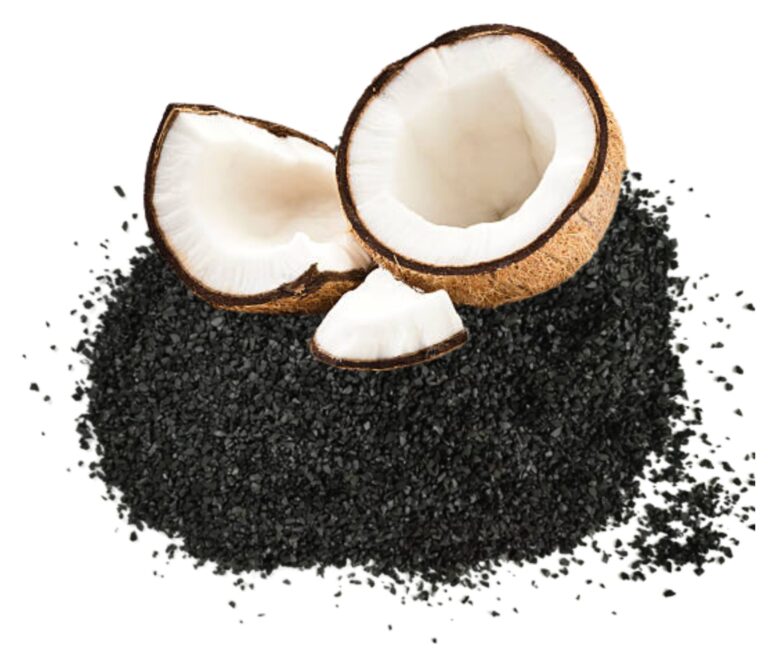
Coconut Shell Activated Carbon
Coconut Shell Activated Carbon (CSAC) is a highly effective and versatile form of activated carbon made from the shells of coconuts. Due to its unique physical properties and high adsorption capacity, it is widely used in various filtration and purification applications, ranging from water treatment to air filtration and even in the food and beverage industry.
Key Characteristics of Coconut Shell Activated Carbon (CSAC):
- Raw Material: CSAC is derived from the outer shells of coconuts, which are a renewable resource. The shells are carbonized and activated to create a porous structure that adsorbs a wide variety of contaminants.
- Surface Area and Porosity: CSAC is renowned for its high surface area, typically ranging from 900 to 1500 m²/g, which makes it excellent at adsorbing contaminants. Its porous structure includes micropores and mesopores, which are ideal for capturing small organic molecules and gases.
- High Hardness and Durability: CSAC has a strong and dense structure compared to other types of activated carbon, such as those made from coal. This gives it good mechanical strength, making it durable and resistant to attrition, which is important in applications where the carbon is subject to physical wear and tear.
- High Iodine Number: The iodine number is a measure of the adsorptive capacity of activated carbon for iodine molecules. CSAC has a high iodine number, meaning it has a very high capacity to adsorb small organic molecules, making it particularly useful in removing organic pollutants, odors, and gases.
- Chemical and Physical Stability: CSAC is chemically stable and does not react easily with contaminants, which makes it effective in various harsh conditions, including high temperatures and varying pH environments.
Applications of Coconut Shell Activated Carbon:
Water Treatment:
-
- Drinking Water Purification: CSAC is widely used in municipal and household water treatment systems to remove chlorine, chloramines, pesticides, herbicides, volatile organic compounds (VOCs), and other trace chemicals.
- Wastewater Treatment: CSAC can also be used in industrial wastewater treatment to adsorb organic pollutants, oils, and heavy metals.
- Decolorization: In the sugar industry and other food processing, CSAC is used to remove color from liquids like sugar syrup and juices.
Air and Gas Filtration:
-
-
- VOC and Odor Removal: CSAC is commonly used in air purifiers, industrial ventilation systems, and HVAC systems to remove VOCs, odors, and harmful gases from the air.
- Environmental Protection: It is employed in systems designed to control air pollution, especially in industries such as chemicals, pharmaceuticals, and food processing.
-
Food and Beverage Industry:
-
- Water Filtration: CSAC is used in the food industry to purify water and other liquids, ensuring they meet quality standards.
- Sugar and Juice Purification: It is used for decolorization and purification of products such as sugar, molasses, fruit juices, and alcoholic beverages like wine and spirits.
Pharmaceuticals and Medical:
-
-
- Activated Charcoal: CSAC is sometimes used in medicine for activated charcoal treatments in cases of poisoning, as it adsorbs toxins from the digestive system.
- Purification of Chemicals: In pharmaceutical manufacturing, CSAC is used to purify and decolorize chemicals, solvents, and raw materials.
-
Gold Recovery:
-
- CSAC is used in the Cyanidation process for gold mining, where it adsorbs gold from cyanide solutions in a process known as Carbon-in-Pulp (CIP) or Carbon-in-Leach (CIL).
Industrial Applications:
-
- CSAC is employed in various chemical processes for solvent recovery, the removal of impurities, and odor control. It is used in solvent purification, and in the petroleum and petrochemical industries for refining and decontamination of oils and gases.
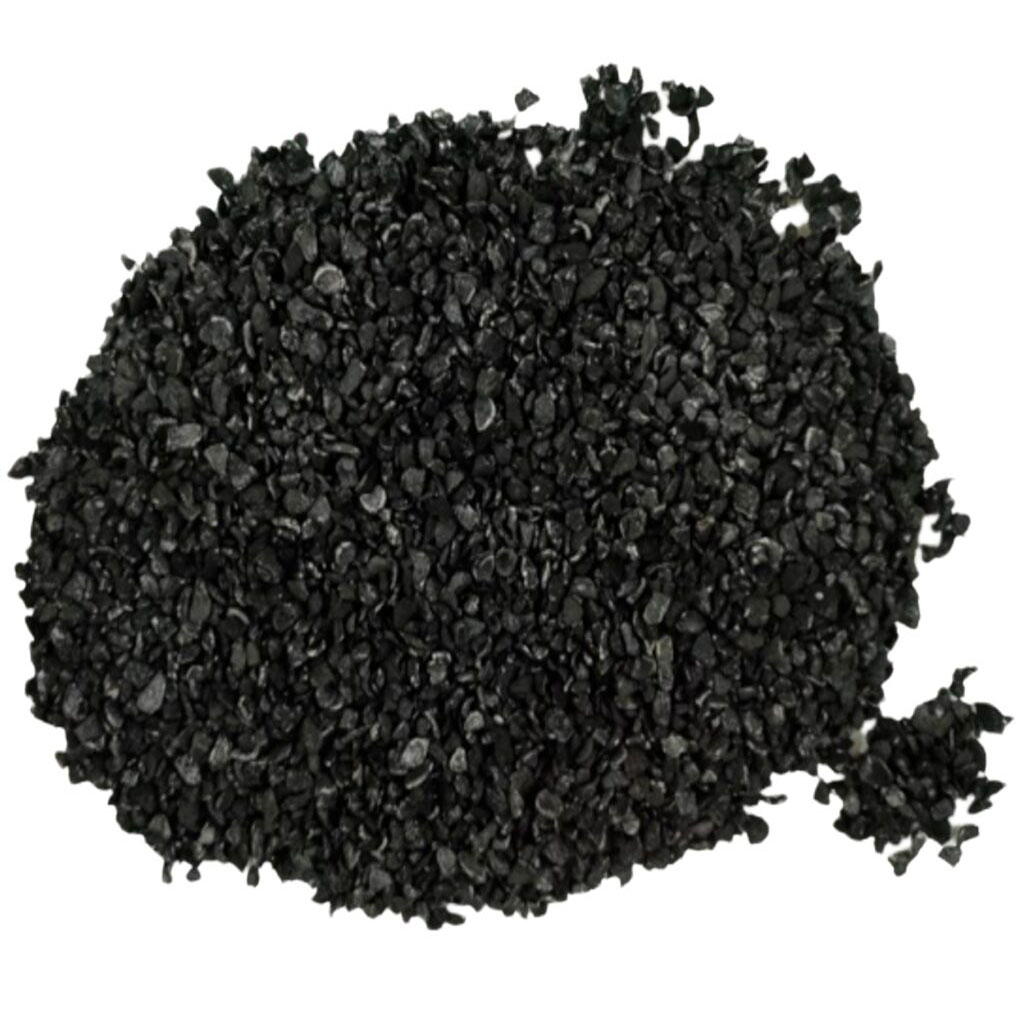
Palm Kernell Shell Activated Carbon
1. Granular (GAC)
